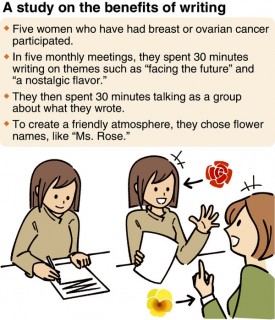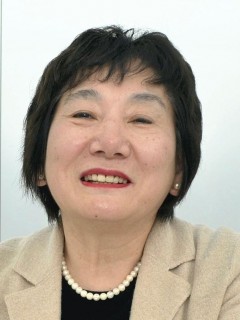▼ Writing Helps Patients Face Down Cancer / Study Points to Therapeutic Benefits of Disease Journals
- Category:Other
Early results on the beneficial effects of writing for cancer patients are out, indicating the practice can help people face their disease and gain a positive attitude.
The research is being led by an expert on sociology who has been studying disease journals for almost 20 years.
On a winter day two years ago, five women in a university classroom in Sapporo were bent over their pencils, writing away. They had been given soft themes — “facing the future” or “a nostalgic flavor” — but this was no writing class, it was a scientific study funded in part by the Japan Society for the Promotion of Science.
The participants were women in their 50s to 70s who had had breast or ovarian cancer.
The study was being conducted by Michiko Kadobayashi, a research fellow at Japan Women’s University, to verify the beneficial effects of writing. Kadobayashi, 61, collaborated on the study with Mizue Shiromaru, a nursing professor at Sapporo Medical University, and others.
Kadobayashi is a leading researcher of disease journals. She started down this academic path after her husband died of pancreatic cancer 20 years ago.
While helping her husband fight the disease, a friend gave her a disease journal written by a pancreatic cancer patient. She was fascinated by the journal and said it was very helpful learning they were not the only ones suffering in that way.
At the time, her children were grown and she was studying sociology at a graduate school. After her husband died, she decided to research disease journals.
In 2011, she published “Ikiru Chikara no Minamoto ni — Gan Tobyoki no Shakaigaku” (Toward a source of the power to live — the sociology of cancer journals), in which she analyzed the changes that occur in patients and their thoughts about disease based on 550 cancer journals.
Decade of research
This compilation of more than a decade of research was covered by many newspapers and magazines.
Next she decided to examine the significance of writing disease journals. After visiting places where writing was used as a form of care, such as clinics in Britain and Ireland where patients write letters to their cancer, she decided she wanted to conduct practical research in Japan.
Kadobayashi, Shiromaru and their fellow researchers met numerous times to prepare for the study.
They thought having participants dive directly into writing letters to their cancer or disease journals would cause them to put their guard up. They also wanted to create a friendly atmosphere that simultaneously protected the participants’ privacy.
After about a year of preparations and ethical screenings, the study was ready to go.
From October 2014 to March 2015, five participants met once a month to spend 30 minutes writing on a theme, then 30 minutes discussing what they wrote.
Instead of calling each other simply “Ms. A” or “Ms. B,” the participants chose a flower for the others to call them by. For example, one woman was “Ms. Poppy” and another was “Ms. Hydrangea.”
Flowers and dolls were placed on the table in the meeting room to create a friendly atmosphere.
After the sixth meeting, the participants said they had experienced a variety of benefits.
“I’m now able to reflect on the past,” one said. Another said, “Now I can reveal to my friends that I had cancer.”
“I feel lighter,” another commented.
Kadobayashi said: “Even if the theme doesn’t directly relate to disease, reflecting on the past while writing allows people to sort out their feelings about their disease. Talking about what they wrote brought them closer together and may have given each of them strength to live.”
The results of the study have been presented at sociology, nursing and other conferences at home and abroad. Other academic colleagues have expressed interest in conducting their own studies.
Next they plan to examine the effects of writing for other forms of cancer and on male patients.
■ Note:
In “Ikiru Chikara no Minamoto ni — Gan Tobyoki no Shakaigaku” (Toward a source of the power to live — the sociology of cancer journals), published by Seikaisha Co., Kadobayashi writes about disease journals published since 1964, her interviews with authors and other topics. She found that both writing and reading disease journals changes one’s thoughts about disease, and provides “power to live.”
From October 2014 to March 2015, five participants met once a month to spend 30 minutes writing on a theme, then 30 minutes discussing what they wrote.
Instead of calling each other simply “Ms. A” or “Ms. B,” the participants chose a flower for the others to call them by. For example, one woman was “Ms. Poppy” and another was “Ms. Hydrangea.”
Flowers and dolls were placed on the table in the meeting room to create a friendly atmosphere.
After the sixth meeting, the participants said they had experienced a variety of benefits.
“I’m now able to reflect on the past,” one said. Another said, “Now I can reveal to my friends that I had cancer.”
“I feel lighter,” another commented.
Kadobayashi said: “Even if the theme doesn’t directly relate to disease, reflecting on the past while writing allows people to sort out their feelings about their disease. Talking about what they wrote brought them closer together and may have given each of them strength to live.”
The results of the study have been presented at sociology, nursing and other conferences at home and abroad. Other academic colleagues have expressed interest in conducting their own studies.
Next they plan to examine the effects of writing for other forms of cancer and on male patients.
■ Note:
In “Ikiru Chikara no Minamoto ni — Gan Tobyoki no Shakaigaku” (Toward a source of the power to live — the sociology of cancer journals), published by Seikaisha Co., Kadobayashi writes about disease journals published since 1964, her interviews with authors and other topics. She found that both writing and reading disease journals changes one’s thoughts about disease, and provides “power to live.”
- February 28, 2017
- Comment (0)
- Trackback(1)



